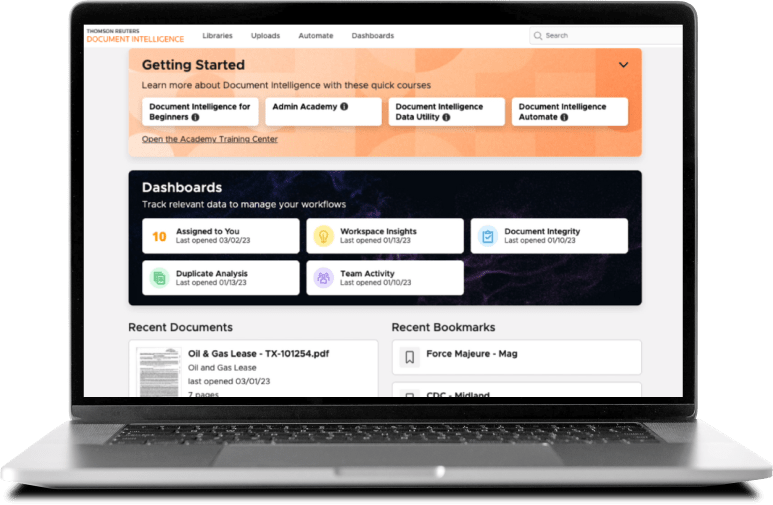In a recent interview, Nina Koteva, Product Manager for Document Intelligence, and Lea Strohm from the Data and Model Ethics team at Thomson Reuters, discuss how Document Intelligence is using Machine Learning (ML) to enable legal professionals to gain immediate insights from their contracts and documents. Koteva focuses on tooling for and integration of ML.


Strohm: What is Document Intelligence?
Koteva: You can think of Document Intelligence as a contract drafting and review assistant– it enables legal professionals to eliminate tasks that take an enormous amount of time or money so they can draft, search, analyse, and gain immediate insights from all their contracts faster and more cost-effectively. Document Intelligence is ready to use from day one because the models have been trained by Practical Law experts.
Learn more about Document Intelligence.
Strohm: Why is AI a good technological solution? Could you explain a little bit about what type of AI technologies you’re leveraging within Document Intelligence?
Koteva: AI is a good solution when it can help any task, process or workflow be faster and most cost-effective while increasing the quality of the output, however, it must be trained specifically for that task. AI can reach its full potential when the data it is trained on is of high quality, specific to a use case, and there are a lot of samples. Document Intelligence uses Practical Law experts who supervise which data will influence the performance of the AI, which ensures high-quality output our users can trust. Using these techniques, the models are more efficient to build, easier to maintain, and perform better than other traditional engineering approaches.
Regarding your second question, we have developed several technologies. Along with supervised learning methods, we use unsupervised machine learning to look for deviations. We are excited and measured about exploring how new, state-of-the-art generative can solve problems.
Strohm: How does Document Intelligence work?
Koteva: Document Intelligence is an AI-powered, cloud-based, SaaS application, and Word add-in that has been pre-trained to identify contract types, classify contract clauses, and extract nuanced terms and critical information. This process instantly creates structured document data, and a table of contents, if you will, that can be used to expedite negotiation, revolutionise contract analysis, and radically improve bulk review projects. Hundreds of thousands of contracts have been reviewed and used to train and maintain the integrity of the technology using natural language processing and machine learning techniques
Strohm: Can you give us some more background on the SMEs’ roles in the technology?
Koteva: Our subject matter experts and Practical Law editors are fully behind the wheel. They are highly skilled legal professionals and therefore they know best what they need to see from the model in terms of quality. Thus, they are in control of the whole model creation lifecycle. The SMEs are responsible for identifying and developing new use cases for the technology, as well as, training, testing, and validating the technology’s performance.
Strohm: Are there user experience steps that you’ve taken to enable these SMEs to trust the models?
Koteva: Trust is always a tricky point. We follow a human-in-the-loop approach, where SMEs play a crucial role in validation. For example, after the model is trained, we’ll have SMEs compare it to the golden truth. They can look at the overall performance and can zoom in and really drill down into the details.
Strohm: Last question. What is something you and your team are extremely excited about?
Koteva: Going back to the external facing application, we are really excited about the new initiative for drafting and the partnership with Microsoft Copilot. We are very eager to see how it’s going to come together.
More on Document IntelligenceRequest a free demo of Document Intelligence. |
 |



